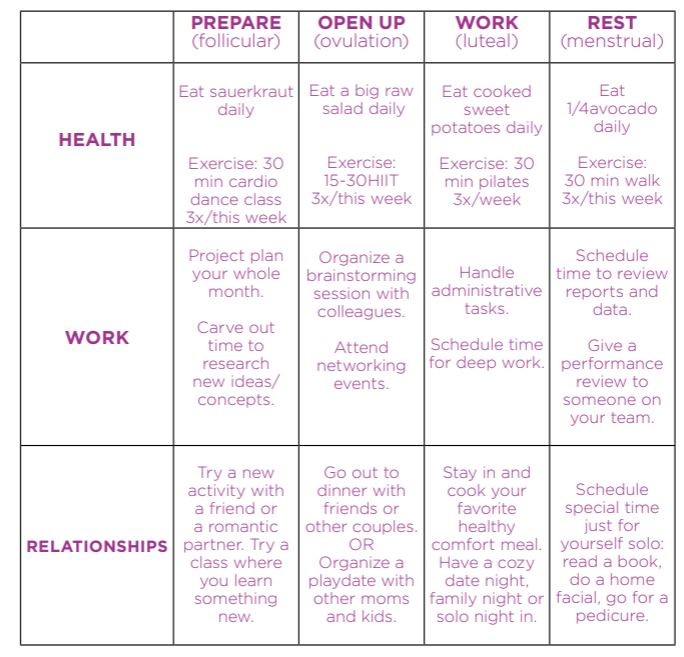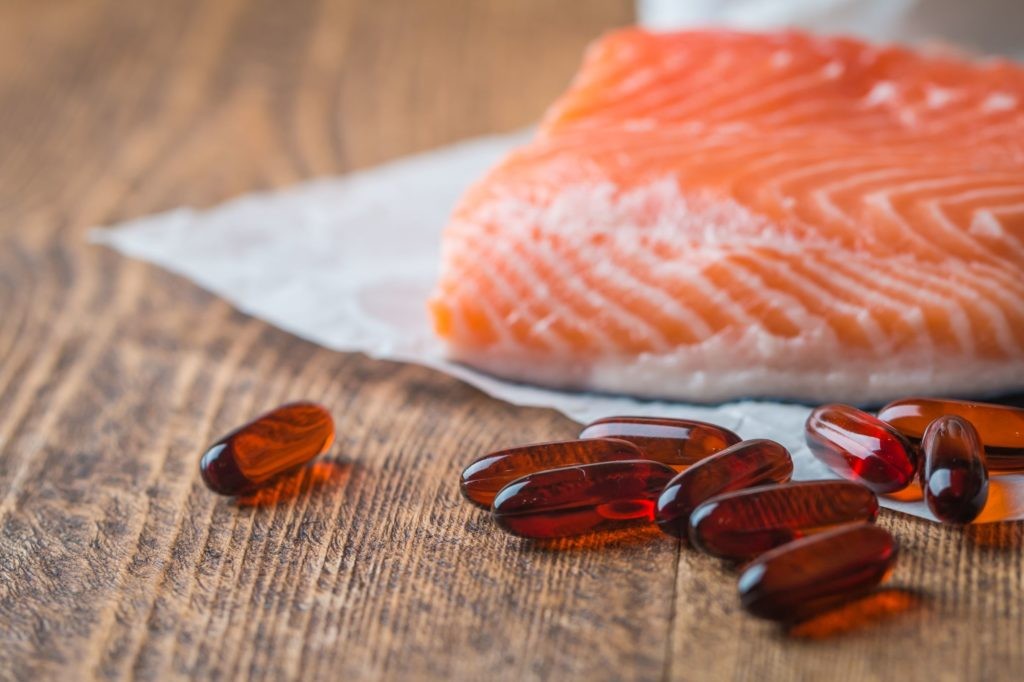
What is Menstrual cycle syncing?
Menstrual cycle syncing is when you eat, exercise, and socialize according to your hormones throughout your period. It was trademarked by Alisa Vitti who has created the Flo 28 program. This program encourages participants to track their cycles, and base their diet and fitness routine around their hormonal cycle.
Alongside her yearly membership to Flo 28 of only $280 per year, Vitti also sells a supplement kit within her program that costs over $2628 per year. In addition, she offers a 4 day detox program which claims to stabilize blood sugar, restore adrenal rhythm, improve estrogen elimination, help you live in harmony with your hormones and engage your feminine energy.
The cycle consists of 4 phases:
Phase 1: Menstruation (part of Follicular Phase)
Phase 2: Follicular Phase
Phase 3: Ovulation
Phase 4: Luteal

Cycle Syncing: Hoax or Helpful?
While I can’t speak to the effectiveness of organizing work and relationships around your menstrual cycle, I can talk about the health recommendations as a registered dietitian.
Her recommendations to eat sauerkraut, raw salad, cooked sweet potatoes and avocado are thankfully very reasonable to include regularly in your diet. However, the claim that they are better in certain phases of the menstrual cycle is not backed by science.
- Sauerkraut is fermented cabbage that is probiotic-rich (contains healthy bacteria for our gut).
- Raw salad is filled with fibre, antioxidants, folate and more!
- Avocados are also filled with fibre, folate and heart-healthy fats.
You do not need to eat these foods on certain phases of your cycle, as a matter of fact, all these foods are very healthy and their inclusion regularly will confer health benefits.
Unfortunately, Flo 28 is a misleading program that lacks scientific research and the recommendations on extensive and expensive supplementation are unfounded. In particular, her claim that she reversed her PCOS is inaccurate and preys upon women who have already struggled through
To help combat the information, I’ve written below nutritional strategies to help support healthy hormones throughout your menstrual cycle.
Dietitian Recommendations On What You Should Eat On Your Period



What should you eat on your period?
- Eat iron-rich foods to help with fatigue and replenish the blood lost. This includes beef, lamb, eggs, tofu, leafy green vegetables, chickpeas, lentils and quinoa.
- Vitamin B-12 has an essential role in supporting healthy blood cells, nerve cells and DNA production. It is readily available in animal sources of protein including meat, chicken, fish, eggs and yogurt. B-12 fortified foods are also available if you are searching for plant-based sources of B12. This includes some nutritional yeast, vegetarian sausages, plant-based soy milk or almond milk.
- Fibre and Water – Changes in estrogen and progesterone can contribute to constipation leading up or during your period. To prevent this, continue to have fibre-rich foods including fruit, vegetables, whole grains, legumes and beans with plenty of water.
- Folate rich foods- Folate is essential in making new red blood cells (that are lost during your period)
- Magnesium-rich foods: There is some research highlighting that magnesium may alleviate period pain, cramps and migraines. Magnesium in combination with vitamin B6 increases the effectiveness of reducing PMS symptoms including anxiety, irritability, depression, headache, nausea, and pain.[1] Magnesium rich foods include dark leafy greens, nuts, seeds, fish, beans and legumes, whole grains, avocados, and low-fat dairy. Foods that are high in vitamin B6 include pork, chicken. Turkey, soy, oats, bananas, milk and fish.
What foods should you avoid on your period?
- Salt – If you want to minimize bloating on your period, you can reduce your sodium (salt) intake. Salty foods cause you to hold onto more water and cause you to feel more bloated than usual.
- Refined carbohydrates – Highly processed foods that are high in refined carbohydrates can cause your blood sugar levels to spike and drop down, leaving you feeling sluggish. If you are craving simple carbohydrates (cookies, chocolate, biscuits), don’t forget to pair it with foods high in protein or healthy fats to keep your energy levels stable. For example, cookies and milk or biscuits and cheese.
Especially in the luteal phase (the week leading up to your period), you may experience cravings for high carbohydrate foods. Your body’s resting metabolic rate is higher during the luteal phase compared to the follicular phase.[2] In particular, one study found that energy expenditure is 8-16% higher in the luteal phase. [3]
What supplements help period cramps and pain?
The combination of supplements that actually have evidence in favor of the use for period cramps and pain are:
- Fish oil and vitamin B12. The combination of fish oil and vitamin B12 significantly reduced period pain, more effectively than fish oil alone. [4] Fish oil was also more effective than Ibuprofen (commonly known as Advil) in reducing severe period pain. [5] Alternatively, you can get both these nutrients from fatty fish including salmon, trout and sardines.
- Magnesium and vitamin B6[6]. These two supplements can help decrease anxiety, irritability, depression, headache, nausea, and pain associated with periods.[7]

Is there scientific research supporting cycle syncing for athletic performance?
There is evidence for athletic performance and strength changing throughout the menstrual cycle.
A recent study on elite female athletes in rugby league found that 93% experienced symptoms related to their menstrual cycle, with 67% of these women reporting that their performance was impacted by these symptoms. [8] A 2020 systematic review and meta-analysis, however, highlighted that exercise performance may be slightly reduced during the early follicular phase (the week of your period) compared to other phases of the menstrual cycle. The researchers highlight that the current evidence is low quality and does not call for general guidelines on changing type or length of exercise across the menstrual cycle. Instead, it’s recommended that training be personalized for the individual and altered if they experience decreased performance during different phases of their menstrual cycle. [9]
In addition, periodization of training according to hormonal changes is very impractical, expensive and inconvenient because: [10]
- Menstrual cycles are not always 28 days and the length of each phase differs between cycles. Periods are also affected by training load.
- Continuous testing of blood or saliva over several months is needed to examine how training and hormones impact each other.
The Flo 28 website states that not aligning how women eat, work and live to their hormonal cycle “increases inflammation and weight gain, decreases your brain health and even adds unwanted stress to your heart!”
Thankfully, there is no evidence to support changes in inflammation, brain or heart health. This is just another case of fear-based marketing of false information to scare people into buying their programs and supplements.
Can cycle syncing help with weight loss?
There is very limited research on syncing nutrition with an individual’s menstrual cycle. The main nutritional consideration when it comes to females and their menstrual cycles, is ensuring that you consume iron-rich foods leading up and during your period to replenish iron stores from blood loss.
There is one study with a small sample size of 31 women that investigated a diet and exercise program tailored to individual’s menstrual cycle (Menstralean group) compared to a control group that followed a simple calorie restriction.[11] Both groups had similar calories (1600 calories/day), except the Menstralean group had the option of eating 200 calories of dark chocolate on day 24-28 of their cycle.
The Menstralean group with tailored macronutrients, calories and exercise plan had a higher protein diet (20-30% protein of total daily calories) than the control group (15-20% of total daily calories).
Past research has highlighted that the high protein diets assist in weight loss and weight maintenance. [12]
Unsurprisingly, the Menstralean group with tailored macronutrients, calories and exercise plan had slightly higher weight loss than the group given generic exercise guidelines and a lower protein diet.
This study shows us that more research is definitely needed on cycle syncing before we can start recommending it as a viable treatment option for weight loss. This study shows when a calorie deficit is achieved, weight loss occurs regardless of how calorie intake is spread out.
The best way to lose weight is through an individualized, high protein diet that creates a calorie deficit. To book in with a dietitian for dietary assessment and planning to achieve your weight and body composition goals, you can contact me here.


